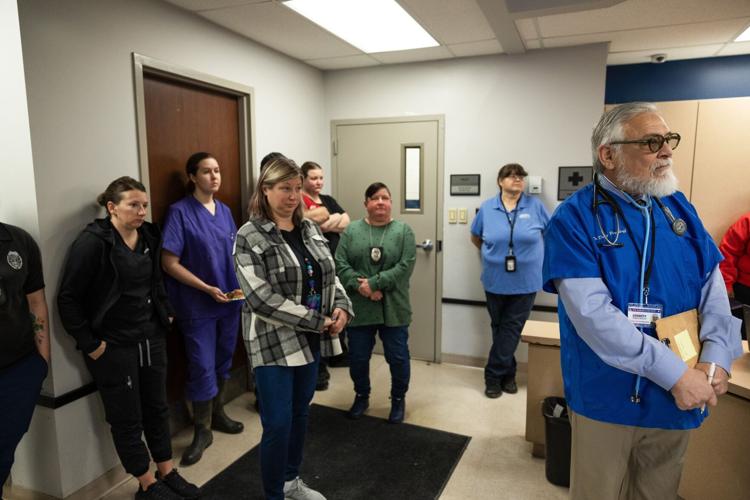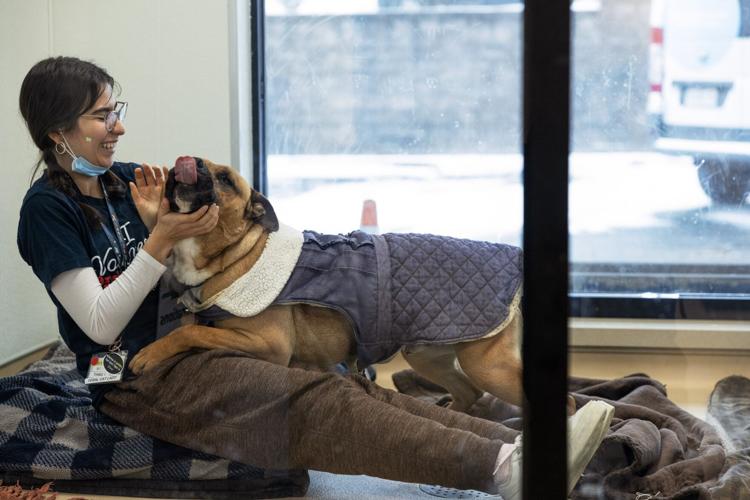CLAYTON ŌĆö The ėŻ╠ę╩ėŲĄ County animal shelter euthanized 19 dogs infected with a virus because it didnŌĆÖt have the space to quarantine them and couldnŌĆÖt afford medical care, its former head veterinarian told the County Council this week.
The shelter was full when parvovirus broke out in late April, Dr. Douglas Pernikoff said in a hearing Thursday.
But the first dog to show symptoms was in a large room with dozens of other dogs, he said. There was nowhere to isolate the dogs exposed, so shelter staff euthanized the first dog and quarantined the rest of them together.
And staff didnŌĆÖt think they had the money to treat them all ŌĆö it can cost up to $1,200 to treat a dog for parvovirus, Pernikoff said, including medication, IV fluids and other treatments. The first dog was euthanized on April 19, and 18 more infected dogs in the following days, he said.
People are also reading…
Shelter staff began vaccinating dogs for parvovirus and giving boosters, Pernikoff added. They also wore gloves, masks, coats and other protective gear to prevent the spread to other rooms in the shelter. They cleaned, and did the best they could with a limited staff and budget, he said.
ŌĆ£We did a lot of actions that were very positive and, in my mind, we stopped the spread,ŌĆØ Pernikoff said.

ėŻ╠ę╩ėŲĄ County Executive Sam Page, left, speaks with veterinary clinician Dr. Doug Pernikoff on Monday, Feb. 24, 2025, at the ėŻ╠ę╩ėŲĄ County animal shelter in Olivette.
The hearing was the third in recent weeks where the council tried to understand what went wrong so quickly at the shelter after the county retook control from the Animal Protective Association. After years of trouble under the county, the APA cleaned up the shelter, leveraged its volunteer and foster programs to improve animal wellbeing, and increased adoptions.
Pernikoff started his job in late January. He attended an open house promoting the countyŌĆÖs takeover of the shelter from the APA, which ran the facility for two years. Pernikoff said Thursday afternoon he expected the job to be difficult but thought heŌĆÖd try it out.
After three weeks, he decided to resign. He didnŌĆÖt have much control over his job. It was difficult to obtain essential equipment.
But health department Director Dr. Kanika Cunningham asked him to stay, and he agreed, Pernikoff said.

ėŻ╠ę╩ėŲĄ County Director of Public Health Kanika Cunningham speaks about the opening of an animal shelter on Monday, Feb. 24, 2025, at the ėŻ╠ę╩ėŲĄ County animal shelter in Olivette. The county retook control of the shelter from the APA on Friday.
Then the parvo outbreak happened. It was an intense situation, and Pernikoff didnŌĆÖt inform Cunningham about the euthanasia. There was no established policy for euthanasia that included Cunningham ŌĆö but Pernikoff told the council on Thursday that he had promised Cunningham after he was hired that he would inform her of euthanasia cases.
After the outbreak subsided in early May, human resources fired him in part because he didnŌĆÖt keep Cunningham informed, Pernikoff said.
ŌĆ£I was remiss in not notifying her about euthanizing animals,ŌĆØ he said.
He asked if he could resign, and the county accepted, Pernikoff said. Later that day, he publicly confirmed his resignation, saying he was ŌĆ£too old to fight.ŌĆØ
He said Thursday he was referring to the ŌĆ£whole systemŌĆØ at the shelter: minimal staffing and supplies, and a low budget.
Republican Councilman Mark Harder, of Ballwin, asked Pernikoff about a picture of the shelterŌĆÖs euthanasia room during the parvo outbreak. ThereŌĆÖs a headless dog in a black plastic bag lying on a table and blood everywhere.
Pernikoff said he beheaded the dog because it had bitten a shelter staffer, and it also had parvovirus. When an animal bites a staffer, it has to be tested for rabies. And testing for rabies can only be done on the brain, Pernikoff said. Beheading the dog made a mess, and he was exhausted. He left the mess for an animal control officer to clean.
ŌĆ£Until you do it, you donŌĆÖt really understand,ŌĆØ Pernikoff said.
In mid-May, the state of Missouri rejected the shelterŌĆÖs application for a license, required by law to operate, after it failed three state inspections since February. The state cited violations for holding dogs in cages too small for them, failing to clean up feces in play yards and allowing bugs in food storage areas, among other problems.
The council called a hearing about the problems in late May, where health department director Cunningham said the countyŌĆÖs human resources department has opened an investigation into the outbreak and euthanasia. Some council members were frustrated with a lack of detail from Cunningham and other staffers at the hearing.
Early this month, the council voted to subpoena 11 people, including Cunningham, to compel them to testify about problems at the shelter. At a hearing in mid-June, a state official said the state could seek to shut down the shelter if it doesnŌĆÖt obtain a license.
Then former staffers began publicly raising concerns about the lack of experience among new managers.
The next state inspection is on Monday.
ėŻ╠ę╩ėŲĄ County regained operation of the animal shelter and adoption center, and during an open house talked of plans to offer fostering and improve the volunteer experience on Feb. 24, 2025. Video by Allie Schallert, aschallert@post-dispatch.com














